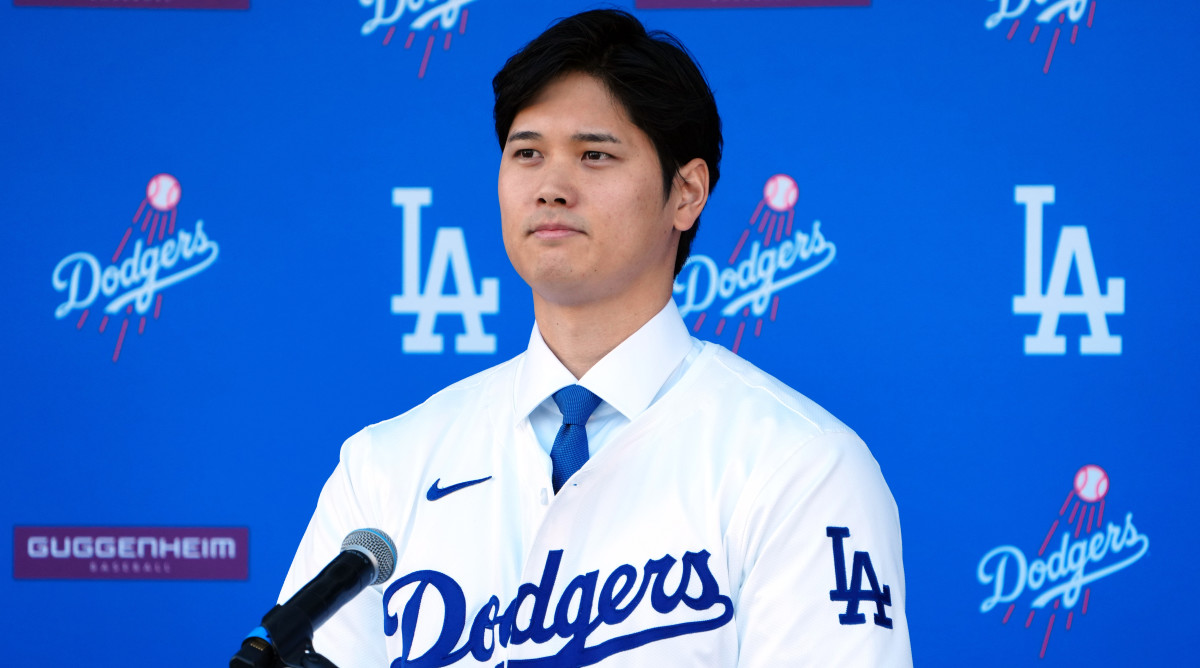Shohei Ohtani Keeps the Curtain Up in His Grand Dodgers Unveiling

The most mysterious man in baseball mostly remained that way on Thursday. Shohei Ohtani, speaking at his Dodgers introductory press conference, which included his first public comments in more than four months, didn’t reveal much about himself—but he did reveal something about the Dodgers.
Fans had been clamoring to hear from Ohtani for nearly a third of a year when he took the stage at Dodger Stadium. He had not addressed the media since Aug. 9, before he tore his right ulnar collateral ligament, costing him the 2024 season on the mound; before he decided to leave the Angels, the team he joined when he came to the United States from Japan before the ’18 season; before he agreed to a 10-year, $700 million deal with the Dodgers on Saturday to become the highest-paid athlete in North American sports history.
On Thursday, in a 19-minute session split between English and Japanese, the 29-year-old two-way superstar took 14 questions, and answered about half of them. (He finally broke his silence on the name of his dog, which he had initially instructed his camp not to reveal. Rumors spread that he was not sharing the moniker because it offered a clue to his free agent destination. The dog’s Japanese name is Decopin and its American name is Decoy, Ohtani said, adding that the Nederlandse Kooikerhondje came with the name.)

His most interesting response came midway through the press conference, the second time he was asked why he had chosen the Dodgers. (“There’s not really one reason,” he said the first time, through interpreter Ippei Mizuhara. “There’s a lot of reasons. I met with a few teams at the end of the whole negotiation process, and honestly every team I met with and I had a chance to talk to, they were all great, and it was really, really a tough decision for me. But at the end of the day I had to choose one team, and the Dodgers were my choice.”)
But on Friday night, when he was weighing his decision, he said, he thought of something Dodgers ownership had told him: that even though the team has made the playoffs in 11 straight seasons, reached three World Series and won a ring, they consider the past decade a failure. He said that mindset appealed to him.
“When I heard that, I knew that they were all about winning and that’s exactly how I feel,” he said.
Some of his new teammates might chafe at their bosses’ characterization of the past 10 years. But that attitude makes it clear—along with emcee Joe Davis’s references to Jackie Robinson and Sandy Koufax—that the Dodgers plan to position Ohtani as a cornerstone of the next era of the franchise, one in which leadership is likely to remain mostly intact. Perhaps because he played for two general managers and four managers in his six years with the Angels, in which the team never reached the postseason, Ohtani insisted on what is known as a key man clause—if either principal owner Mark Walter or president of baseball operations Andrew Friedman leaves the organization, Ohtani can opt out of his deal.
“Everybody has to be on the same page in order to have a winning organization,” Ohtani said. “I feel like those two are at the top of it and they’re in control of everything, and I feel almost like I’m having a contract with those two guys. I feel like if one of them are gone, then like I said, [we] might not be on the same page. Things might get a little out of control. So I just wanted, like, a safety net.”
He added that his unique contract structure is similarly designed to ensure the Dodgers win: He is deferring 97% of the money, meaning he will make only $2 million per year for the next 10 years, then receive the other $680 million after 2033.
“I was looking into it and doing some calculations and I figured if I could defer as much money as I can, if that’s going to help the [luxury-tax number], and that’s going to help the Dodgers be able to sign better players and make a better team,” he said. “I felt like that was worth it, and I was willing to go that direction, so that’s why I made that choice.”
Ohtani was less open about his September surgery.
“I’m not an expert in the medical field,” he said. “It was a procedure. I’m not sure what it was called.” Ohtani added that it was different from his initial Tommy John surgery and suggested anyone with questions direct them to his doctor, Neal ElAttrache. (ElAttrache has told the Los Angeles Times the procedure was a second Tommy John.)
Ohtani also declined to reveal which teams he considered or even how many there were. He declined to reveal whether he had volunteered his unique contract structure to those other clubs, whoever they were.
But he made it clear he expects the Dodgers to win while he is there. And by signing him, the Dodgers made it clear they expect the same.
